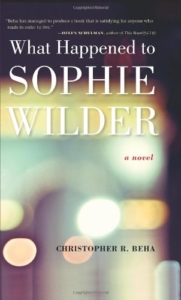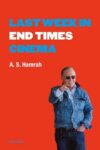The ways in which literature directs the courses of our lives, from the books we read to the books we struggle to write, consumes What Happened to Sophie Wilder, the debut novel from Christopher Beha. The novel’s protagonists, Charlie Blakeman and Sophie Wilder, tell each other stories: on walks around the campus of a small liberal arts college in New Jersey; over late-night cigarettes and Jameson in Sophie’s dorm room; during breaks from long hours spent writing side-by-side in silence.
Sophie Wilder is attractive, driven, and literary to a fault. On first meeting Charlie, she is liberal with her opinions: Pale Fire and Ada before Lolita; no Beats. The latter is a sharp riposte to Charlie, a restless college freshman and native New Yorker with a major case of the Kerouacs. “Burroughs is pretty good,” Sophie concedes. “Most of the rest is shit.” Ambitious for literary success, Charlie and Sophie complete one another, each making notes in the other’s margins, each learning “how to give up this world and live in another long enough to make it seem real.”
Fast-forward to the present. Charlie is in his late twenties, “the age where it no longer [makes] sense to talk about ‘promise,’” and he has recently published his first novel, though the world, he tells us, has already forgotten. Charlie and his cousin Max, a film critic at a weekly magazine, live in a townhouse along Manhattan’s Washington Square. A true New York fairy tale, the owner is never home, allowing the guys to stay up late, throwing parties and debating the value of cultural criticism.
Beha peppers the narrative with just enough recent history (the 2003 blackout; media blogs) to keep the novel contemporary, but the story could just as easily take place when dinosaurs like Trilling and Bellow roamed the earth. Time-shifts and changes in narration between Charlie and Sophie make the story seem timeless and a little nostalgic, caught in the amber of a Washington Square autumn.
Charlie hasn’t seen Sophie in years when she shows up uninvited to one of his parties, and it’s here that we begin to understand what has happened to her. She’s since married and separated from another college beau, Tom, and written a buzz-worthy collection of short stories that has given her modest fame, a little money, and expectations for a novel. She has also converted to Catholicism. But even her religious choices carry some affectation. She approaches the Bible as a literary critic might: the King James version feels “truer to her in its beauty, closer to God’s real voice.”
Sophie’s reappearance could be seen as a resurrection, a return of the muse, and yet Charlie begins to wish she had stayed gone. Her return is like a glaring editor’s note demanding that he add another character and drastically shift the plot. Still, each of them feels the need to be a part of the other’s story. “She could be married to Tom forever, and I wouldn’t interfere with that,” Charlie realizes, “but we would be together.”
What Happened to Sophie Wilder is a first novel about first novels. Beha focuses on what comes after the late-twenties period that can make or break a writer, from madness to happiness and growth. It’s fitting that Sophie Wilder follows 2009’s The Whole Five Feet, Beha’s memoir about reading the 51-volume Harvard Classics Library. Filled with characters who live and breathe literature, the novel buzzes like a late-night conversation, dizzy with ideas.
This post may contain affiliate links.








